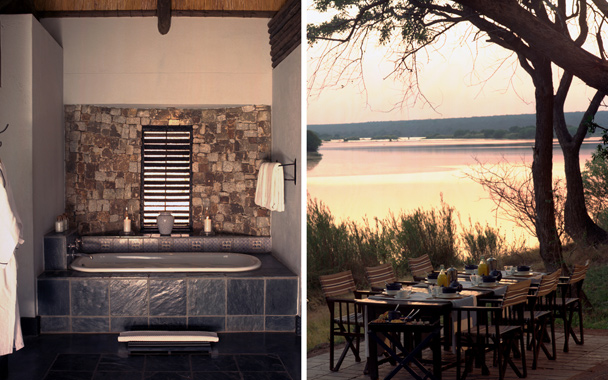Matetsi Water Lodge is one of those places you can’t quite believe is real. Or at least you can’t believe, sitting on the teak deck of your thatch-roofed bungalow, watching a family of warthogs sniff around your plunge pool as the Zambezi River meanders lazily by (they must have named it “mighty” at some other time of year), that you’ve managed to land yourself there. Mornings begin with coffee and warm biscuits delivered to your door—wake-up calls here come in the form of a gentle knock—on a tray with thick napkins and heavy silver, and days combine close encounters with lions and elephants (yours being the only vehicle for miles) with sundowner cruises starring crocodiles, hippos, and walking-on-water “Jesus birds.” The bungalows are quietly luxurious, appointed in dark leather, lush bedding, and minimalist African art, and the vibrant, creative food is served with South African wines in varietal-appropriate stemware.
That this place is in Zimbabwe makes it all the more hard to fathom.
I wish I could say that I’d enjoyed Matetsi the way I should have (when I go back, I will), but the truth is that by the time I arrived at the lodge, the terror of Zimbabwe circa 2009 had taken root inside me.
What was I doing there in the first place? I’d planned the trip last summer (after, but then before, the country was making the headlines every day), as a way to visit an old friend in Harare and stay at Matetsi, which is run by andBEYOND (formerly CCA, or Conservation Corps Africa), a company I’ve long admired and whose lodges I’m always looking for an excuse to check into. The idea to also write an article that would be deeply incriminating of crazy-man-president Robert Mugabe came much later.
Journalists aren’t so welcome in Zimbabwe these days, so on the way over, I re-read articles about Mugabe and his 28-year grip on power, then dump them in the trash at the Johannesburg Airport. In the half-dark of the Harare arrivals terminal, I scribble “teacher” on the immigration form and, at the request of my friend, pencil in the name of a hotel where it asks for “local residence.”
“No luggage?” she laughs, as I go to hug her outside. Apparently it’s an event here when the bags arrive with their owners.
I will tell you that my friend’s neighborhood is leafy and lovely, that her backyard has the requisite pool, tennis court, and in-ground trampoline. I’ll tell you that her children attend a perfectly manicured, open-plan school, where little girls with blonde hair skip from the tidy computer lab to the well-stocked art room and are picked up at dismissal by chauffeurs in four-wheel-drives.
But that’s about all I can tell you, because according to the people who live in Zimbabwe, Robert Mugabe and his ZANU-PF cronies scour the Internet and then take whatever measures they deem necessary to silence dissenters and their relations. (At least that was presumed to be the case two months ago, before cholera had engulfed the place and the cash shortage had gotten so bad that civil servants and others no longer even bothered to report to work.) You’ve read about the starvation, the inflation, and the disease, about the “disappearances” of journalists and human rights activists. What you can’t imagine—or at least I couldn’t have—is the fear and paranoia that pervade Zimbabwe.
Some snapshots:
· My friend asks whether I’d mind, after typing them into my laptop, tearing up my notes into tiny pieces and burying them amid her compost.
· As we’re talking in her living room late one night, she stands up, walks over to the window, and quietly clasps it shut: Who knows if the night guard is ZANU-PF?
· The twenty-something local who’s serving as my driver/fixer introduces me to a friend of his, an “opposition” activist (the Movement for Democratic Change, or MDC, actually won more votes than did Mugabe’s party in the election last March), whose nose bears the graphic memory of a run-in with a ruling-party machete.
· A young woman who’s acted as an important source, and with whom I’ve spent the past two days, introduces me to her own husband with the same lie (“Catholic charity worker”) that I’ve originally used on her.
· A burly white farmer asks me whether I have the number of a lawyer, just in case. “You can’t be too paranoid,” he says.
· A grandmother affiliated with the MDC describes how she hid in her ceiling for three days to avoid being discovered by Mugabe’s thugs. She adds through tears that she expects them back to kill her any day.
· A distinguished-looking guard at the elegant (and dead-empty) colonial-era Victoria Falls Hotel asks how I am, and when I respond in kind tells me, “I am not fine. I am hungry.”
· After three hours waiting in the dingy domestic departures terminal of the Harare Airport, I look on with my fellow passengers as a wailing, flashing entourage skids to a halt before the picture window; dozens of bereted soldiers jump out, automatic weapons aflourish; and Mugabe and co. climb the now-red-carpeted stairway to what we’d previously understood to be our plane. Two more hours pass as we wait for the airport to hunt down some fuel for the single remaining Air Zimbabwe craft.



 Pinterest
Pinterest


